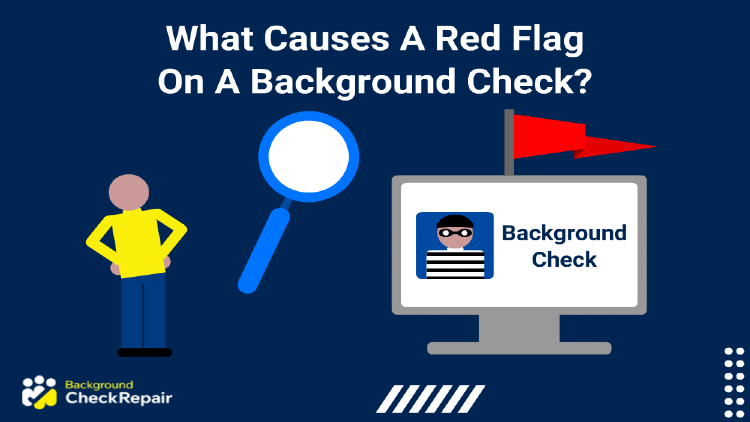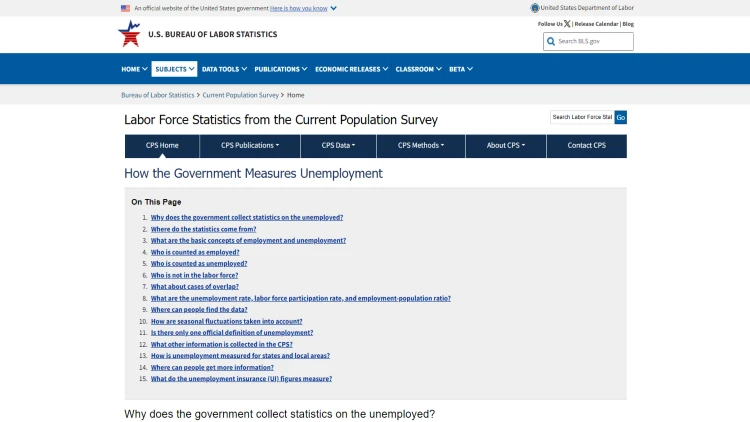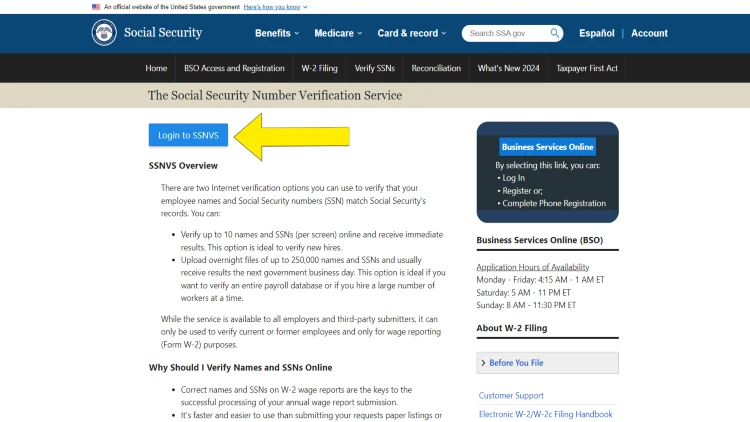
What causes a red flag on a background check?
Don’t just assume that your record is clean! This can be the worst mistake anyone can make because if there’s something on the background check that’s going to cause a red flag, it should be dealt with before a potential employer, landlord, or creditor finds out about it.
Getting hired can be difficult, however, not knowing what’s on a background check can be detrimental, especially if some records are incorrect or haven’t been expunged, so knowing “what aspects are checked in a background check” can mean the difference between success and a failed background check.1
Background checks are an essential stage in the recruiting process for businesses, and one can use them to their advantage in their job hunt.5
To know exactly what will show up on a background check, learn how to self-conduct a check first to eliminate any red flags that could show up.
This guide pinpoints any red flags that may show up so that anyone can take steps to repair their background check quickly.
What Are Red Flags on Background Checks?
What causes a red flag on a background check? And, what factors do companies evaluate? It’s not only a person’s degree or where they went to school that will impress future employers.
Employers are generally concerned about work experience, personality profile, communications skills, cultural fit, and leadership experience. That is why they conduct background checks to verify the details a potential employee presents to them.
But, companies also must protect themselves from liabilities, and a big part of the background check is viewing criminal records.
Here are some red flags on background checks that can disqualify one from getting a job they applied for.1
Criminal Record
Examining a candidate’s criminal background is perhaps the most crucial component of any background investigation. If an organization doesn’t conduct criminal history checks on individuals who later commit a crime, the organization could be held liable. While some instances may not prevent a business from hiring a candidate, knowing an employee’s criminal background is vital.
However, one must consider the context of any information uncovered during a criminal history check. Arrests do not always mean convictions and minor or long-ago incidents could result from being in the right spot at the wrong time.
While these results may not be a bone of contention in and of themselves, businesses should be wary of employing someone who lies about their criminal history in a job search or interview. A candid individual who is open and takes the time to explain the problem honestly demonstrates more reliability than one who misleads about their previous records.
Refusal To Receive a Background Check
Candidates must be willing to submit to a background investigation. When a candidate refuses to accept a check, it’s usually a sign that they’re concealing something. If a candidate refuses a background check, the company can reject them from selection without repercussions; thus, it’s best to move on to another prospect.
Missing Relevant Past Jobs
While falsifying experience on a CV is not a good idea, the contrary should also be avoided. Occasionally, job seekers will exclude relevant positions or experiences from their resumes. When job hunting, applicants want to present their best selves, but the lack of suitable possibilities suggests they may want to conceal anything about those positions.

(Image: cottonbro studio10)
The new employee may have a justification for the incomplete details, but it is advisable to consult these previous employers to acquire as many details as possible.1
Inconsistency in Experience or Education
Inconsistency is among the most prevalent red flags in a background investigation. If due diligence for employment turns up material that contradicts what the applicant and their résumé claimed, one should look into it further. To make oneself more attractive to a business, they may make things up about their schooling, professional experience, or the roles and responsibilities they held.
Whereas many potential employees exaggerate their résumé to make themselves appear as excellent as possible, one should approach with care if the misrepresentations become fraudulent. Even if they have the requisite skills in other fields, this glimpse into their behavior must be considered in the future.
Multiple Periods of Unemployment
Employment gaps6 are typical, and many prospective candidates’ resumes may include periods of unemployment. Someone may have changed careers, become unwell, or taken time away from work for a family member.

However, if unemployment appears to be a trend in the candidate’s background, one should look into it more. Recurrent breaks in employment may suggest that the individual is challenging to work alongside, untrustworthy, or otherwise unable to maintain employment.2
Multiple Short-Lived Jobs
Someone with various short-term jobs, like someone unemployed for a long time, could be a source of concern. While occasional or temporary appointments are fine—and excellent for acquiring experience—someone who jumps from job to job is unlikely to be a good fit for the firm.
It could indicate that they were dismissed or forced to step down or quickly bored or dissatisfied with their current work. Most organizations want to invest in dependable, long-term personnel, and this type of individual is unlikely to meet those goals.
Job-Relevant Convictions
While lesser convictions or occurrences from years ago may not raise red flags during an occupational background investigation, consider how a person’s criminal past may affect the job at hand. Anyone with a bad driving record, for example, shouldn’t have a job that requires them to operate a vehicle.
Even if the charge is small, an individual charged with fraudulent activity will not be the first pick for a position at a bank. The impact of a previous crime on the job and company is significantly more relevant than the offense’s date or the punishment’s severity.
Poor Credit History
Many background checks may not require a credit check, but any employment that deals with money may require one. Take into account that an individual’s bad credit could result from other life tragedies like death or divorce, and it may not affect their ability to execute the job.

If one is hiring for a job that includes receiving money, be mindful of applicants struggling with debts and loans.2
Bad References
References are an excellent method to discover more about a possible individual’s personality and work ethic, and speaking with previous employers can quickly corroborate previous experience. An organization can get nasty comments about the individual if they phone prior employers.
It’s crucial to remember that negative feedback can result from misconceptions, personal concerns, or circumstances beyond the individual’s control. If the same unfavorable opinions keep popping up, one should consider this when deciding whether or not they will fit into the job and job environment.
Failed Drug Tests
Does the background check entail drug tests? If the job requires the individual to operate machinery, drive, or engage in other activities that need the person to be free of alcohol and drugs, then they may need to seek a drug test.
A failed drug test is significant since it indicates that the individual may endanger business clients or other staff.
Driving Records
If the position requires driving, an individual’s driving history (MVR Report) can be a red flag if there are multiple problems. For example, a pattern of speeding, DUIs, or other driving-related offenses.
Examining a person’s social media presence is another technique to learn more about their character. While it is wrong to dismiss individuals based on their political beliefs, the business may want to consider a different candidate if they discover a person has dubious values or is publishing hate speech. In essence, this could save the business money in the long run.1
Identity Inconsistencies
Employers might benefit from social security number verification7 in a variety of ways. For starters, they reveal any previous names or nicknames an individual may have, allowing an employer to perform a more extensive background check. Second, they show a candidate’s previous addresses, which employers can use to supplement a criminal background check with further county criminal background searches.

Third, they check whether someone is who they claim they are to see if they are misleading about their persona or using false identification. Any of these scenarios can be a significant red signal for hiring.
What Does a Failed Background Check Look Like?
What causes a red flag on a background check? Businesses may run background investigations to verify one’s qualifications when they apply for a new job. The background check elements may differ depending on the organization, the sector of employment, and the job description. Failure to pass a background investigation might result in a person being disqualified from a job, so it’s critical to understand these aspects and how to guarantee the background matches the standards of the future employer.
A failed background check has:3
- An inconsistent employment history
- An inaccurate resume information
- A criminal history
- Negative reviews from employers
- A poor driving record
- A failed drug or alcohol test
- A poor credit history
What Are Red Flags in an Employment Background Check?
What causes a red flag on a background check? The finest of the finest is expected to serve and lead a corporation. Staff hiring is stressful enough, but adding a background investigation can make things even more difficult. While no one is flawless, managers will not evaluate a candidate if they have factual flaws.
What qualifies as a red flag varies by organization and position, but criminal convictions, disparities, and demeaning remarks are the most prevalent red flags. Acknowledging the most pervasive background investigation red flags and how they influence a person’s qualifications helps companies recruit the best candidate in the company.3
Do Omitted Jobs Show Up on Background Check?
It is sometimes desirable to remove previous employment from one’s CV and work history when seeking employment. However, this might cause problems, so they should question themselves, ” Do omitted jobs show up on background check?” before doing so.
While not all companies do so, most Human resource departments will check a candidate’s recommendations and make contact with prior employers. They won’t have any direct way of knowing about any positions the person left off their resume, so they won’t be able to contact prior employers whom the individual hasn’t told them about.
Because their concentration is on criminal history, if the individual has any police records, an impartial background check is unlikely to turn up employers that haven’t been listed. If something that occurred during one’s tenure with the company they’ve never listed was criminal, it would appear on the background investigation; otherwise, there is no need for jobs to appear.4
What Happens If You Fail a Background Check?
If a person fails an employment background check,8 they will most likely need to look for new work. A transgression or red flag that disqualifies a person from a recruiting process in one place may not have the same effect in another. Some companies are more forgiving and prepared to offer candidates a second shot.
Knowing what causes a red flag on a background check can help applicants remove these ‘dangers’ before a potential employer sees them.
Frequently Asked Questions About What Causes a Red Flag on a Background Check






